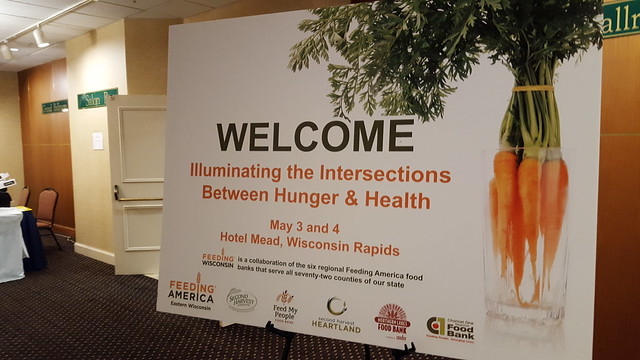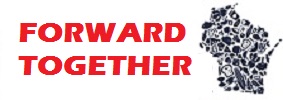2016 Summit
Feeding Wisconsin’s Spring Hunger Summit, “Illuminating the Intersections of Hunger & Health” was held May 3 and 4, 2016 at Hotel Mead, Wisconsin Rapids
Hunger and health are intimately connected. Food is a basic need and without it, or without enough of it, people will not be able to live healthy lives.
Simply put, food is the fuel that enables us to live.
This is something that we all know intuitively but over the last few years, some extremely compelling research has begun to prove that hunger and food insecurity have immediate and lasting health effects.
And the anti-hunger community has responded by establishing new and innovative partnerships with the health sector to fight hunger and improve health outcomes.
On May 3 and 4, Feeding Wisconsin hosted a statewide conference focused on the intersections between hunger and health to provide a space for funders, advocates, direct service providers, health providers, state agencies, and policy makers to foster the networks and to share best practices so that together we can accelerate our work toward a healthy and hunger-free Wisconsin.
Schedule of Events
May 3
5:30 pm: Opening Reception
May 4
7:30 am: Welcome Breakfast
8:15 am: Opening Plenary Session
“Fighting Hunger, Increasing Health Outcomes, and Addressing Disparities Across the State: Where we have been and our path forward”
Christopher Abbott
Health Plan CEO, Medicare and Retirement
United Healthcare
Marcy Buren
Director, Community Health
Ascension Health
David Lee
Executive Director
Feeding Wisconsin
Ken Taylor
Executive Director
Wisconsin Council on Children and Families
9:45 am: Session Block A
The Safe and Healthy Food Pantry Project
Track(s): Health & Community Engagement
More families in Wisconsin are depending on food pantries as a consistent food source to feed their families. Presenters will review the links between health disparities and outcomes for individuals facing food insecurity. A step-by-step toolkit will be introduced that can help pantries implement practices to support a healthier food pantry environment. Session participants will leave with some quick suggestions on how to make their food pantries safer and healthier.
Speakers:
- Jennifer Park-Mroch, UW Extension
- Sheila DeForest, UW Extension, Rock County
- Yolanda Pena, UW Extension, Walworth County
- Donna Ambrose, Caritas
Farm to Institution: Using local foods to enhance community health and alleviate hunger
Track(s): Innovation & Health
Increasingly, institutions of all types are incorporating local foods into their meal programs as a way to keep their programs fresh, increase marketing opportunities and ultimately reach more eaters! In this session you’ll hear from a panel of farm to institution experts speak about how and why they choose to incorporate local foods into their programs, and how it benefits their institutions and their communities. Panelists will include experts on farm to summer, farm to hospital, and farm to school. Join us to understand how to find and purchase local food items, beyond just fruits and vegetables. Then learn more about how to successfully incorporate and promote these items to strengthen your efforts. Local foods are a successful strategy for urban and rural areas, and this session will identify successful strategies appropriate to different geographies.
Speakers:
- Larry London, ThedaCare
- Sarah Wright, Winnebago County Health Department
From Roots to Results: Community Health Capacity Building in Wisconsin
Track(s): Community Engagement
Across Wisconsin, people are organizing to take action on the priority issues for their community's health. For many communities, making headway on their issues requires a new way of working. This means building skills in engaging with the community from the beginning, looking at root causes, thinking about what would have a sustainable impact, developing a theory of change and an action plan, and building a strong, multi-sector partnership to effectively address the multiple factors that determine whether or not every Wisconsin resident has the opportunity to achieve their full health potential. For over a decade, the Healthy Wisconsin Leadership has reached all corners of the state delivering accessible leadership edu cation and training. This presentation includes results and lessons learned in building community capacity and applying an equity lens to inclusive community and public health leadership development.
Speakers:
- Stephanie Richards, Healthy Wisconsin Leadership Institute
- Lesley Wolf, Healthy Wisconsin Leadership Institute
Download presentation
Healthy Wisconsin Leadership Institute One Pager
Real Life Nutrition on FoodShare
Track(s): FoodShare Outreach
Could you survive eating on a SNAP food budget? Could you stretch your SNAP dollars to last the entire month? How about eating HEALTHY on a SNAP food budget? SNAP-Educators tackle the “Eating Healthy on SNAP” conversations everyday within their teaching sites with SNAP recipients. SNAP recipients tackle these challenges every day. Come and learn approaches, challenges, tricks of the trade, and how to engage learners in eating as healthfully as possible on a low monthly food budget.
Speakers:
- Jill Hicks, UW Extension, Wood and Portage Counties
- Penny Schmitt, UW Extension, Wood and Portage Counties
11:15 am: Session Block B
Hunger & Health Coalitions: HungerCare and Food as Medicine
Track(s): Health & Community EngagementFood insecurity is associated with increased health problems among low-income adults and children, including: increased hospitalizations and emergency department visits; medication underuse and refill delays; overweight and obesity; and significant increased risk of chronic diseases. For these reasons, many local coalitions between anti-hunger and healthcare stakeholders have emerged in the last few years to further advance anti-hunger goals while increasing health outcomes. Join this session to learn more about the HungerCare coalition in the Madison area and The Food as Medicine Planning Partnership (FAMPP) in Eau Claire. During the presentation, we will share processes used to convene the coalition; current efforts to gain investment of local health care systems in food insecurity assessment; and efforts to connect health clinics and food resources to meet the needs of residents experiencing food insecurity.
Speakers:
- Mary Canales, UW Eau Claire
- Nancy Coffey, UW Extension Eau Claire County
- Paul Savides, Community Organizer
- Anne Gargano Ahmed, Second Harvest Foodbank of Southern Wisconsin
- Beth Neary, MD, MS
Download Food as Medicine presentation
Download HungerCare presentation
Watch the HungerCare video
Innovative Nutrition Education: From Children to Families
Track(s): Innovation & Health
Nutrition education doesn’t just have to happen in a classroom. Often, it can be on the road or in a food pantry. Join this session to learn about two innovative nutrition education initiatives that leverage the mobile classroom, urban gardens, and a Kids Corner program that empowers children to make healthy food choices.
Speakers:
- Heidi Katte, Milwaukee Area Technical College
- Terri Green, Osh Kosh Area Community Pantry
Healthy Partnerships: Food Pantry Case Studies in Urban & Rural Settings
Track(s): Community Engagement
Ashland and Bayfield counties in Northwest Wisconsin could not be more different than Milwaukee in Southeast Wisconsin. At almost opposite sides of the state, Ashland and Bayfield are rural, remote, with sparse populations and Milwaukee is urban and dense. Yet, strategies that successful food pantries in these areas have employed are similar and translatable to any area. Join this session to learn how two food pantry networks – the BRICK and the Friedens Community Food Pantry Network – have effectively engaged their stakeholders and communities to evolve and grow to meet the needs of their communities.
Speakers:
- Elizabeth J. Seefeldt, The BRICK Ministries
- Catherine Draeger, Friedens Food Pantry Network
Download Healthy Organization presentation
Download Healthy Volunteers presentation
Innovative FoodShare Outreach & Best Practices
Track(s): FoodShare Outreach
Learn about innovative outreach efforts across the state aimed at reaching some of Wisconsin’s most vulnerable populations and connecting them with FoodShare. Tips, tricks and best practices will be explored, including effective mailing campaigns, messaging, and other strategies that have helped to better inform potentially eligible FoodShare customers seeking information and applying for benefits. The audience will have an opportunity to share their own best practices with others.
Speakers:
- Stephanie Jung, Second Harvest Foodbank of Southern Wisconsin
- Carolyn Gomez-Tom, Covering Wisconsin
- Elizabeth Macpherson, Feeding Wisconsin
Download presentation
FoodShare Outreach Partner Information Sheet
FoodShare Outreach Half Sheet
FoodShare Outreach Half Sheet in Spanish
Able-Bodied Adult without Dependents Work Requirements Fact Sheet
12:30 pm: Luncheon Plenary and Keynote
"Community, Food, and Funding: Working together to improve the health of our community"
David Nelson, PhD, MS
Associate Professor, Family and Community Medicine, Medical College of Wisconsin
Board President, Friedens Community Ministries Food Pantry Network
2:00 pm: Session Block C
Working with Your Local Hospital and Community Health Clinic
Track(s): Health and Community Engagement
The Affordable Care Act created many opportunities for local organizations to work with their hospitals and community clinics to fight hunger and improve community health but figuring out how best to engage your local hospital can be tricky. Join this session to learn from hospitals and healthcare providers of all sizes how to most effectively engage and partner with your local hospitals.
Speakers:
- Lisa Bell, SSM Healthcare of Wisconsin
- Marcy Buren, Ascension Healthcare
- Heather Logelin, River Falls Area Hospital, part of Allina Health
Download Hospitals and Collaboration presentation
Download Community Health Needs Assessment presentation
Download Inside the Head of a Hospital President presentation
Food System Innovations in Hunger Fighting
Track(s): Innovation
Interested in learning how to leverage community partnerships to develop local food supply chains that increase food quality for hunger relief partners? In this session you will hear from a few of Wisconsin’s innovation leaders working on creative food recovery, energy efficient indoor farming, and food hub initiatives. Join this session to learn about this range of innovative food systems projects designed to develop the local food sector and increase sources of fresh, locally grown produce for hunger-relief programs.
Speakers:
- Alex Tyink, Feeding America Eastern Wisconin
- Gary Thompson, Community Hunger Solutions
- Daniel Chotzen, Community Hunger Solutions
Download FAEW presentation
Download CHS handout #1
Download CHS handout #2
Building Community Capacity to Fight Hunger & Improve Health
Track(s): Community Engagement
Learning about and engaging the people who utilize our services helps us best serve them. Join this session to learn about three very different community research projects that have yielded deeper insights about community food insecurity in Brown County, the homeless population in Eau Claire, and about the recipients of service at a food pantry and meal program in Milwaukee. Take home with you easy to implement tools to further support and engage with deepen your insights about your clients.
Speakers:
- Ken Adler, Chippewa Valley Free Clinic
- Karen Early, UW Extension, Brown County
- Salma Abadin, Wisconsin Population Health Service Fellow
Download Brown County Food Security Survey presentation
Download Engaging in Conversation presentation
Download Assessing the Needs of the Homeless in Eau Claire presentation
Increasing FoodShare Benefits through Healthy Incentives
Track(s): FoodShare Outreach & Health
Many Wisconsin residents rely on FoodShare (FS) to help feed their families. Food insecure families often have less access to fresh produce. Offering EBT and incentive programs at farmers markets improves health equity and community inclusiveness. Presenters will share their experience developing EBT/incentive programs, program promotion, how volunteers are assisting, utilizing UW-Extension/WI Division of Public Health state evaluation tools, and building private/public dollars commitments to gain financial sustainability.
Speakers:
- Nancy Coffey, UW Extension, Eau Claire County
- Kate Beaton, AmeriCorps VISTA, Eau Claire County
- Meghan Meyers, Live54218, Brown County
- Kelli Stader, Wisconsin Department of Health Services




